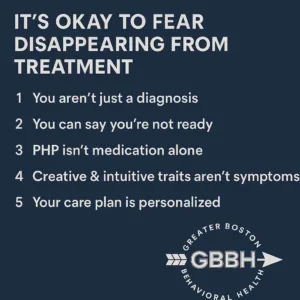It’s not that you don’t want help. You just don’t want to disappear.
Maybe someone just said “major depression.” Maybe your provider mentioned a mood stabilizer and your stomach dropped. Maybe you’re scrolling through mental health content late at night, wondering if a diagnosis means you’ll lose the best parts of yourself.
That fear? That quiet dread that treatment might flatten your spark or make you unrecognizable to yourself? That’s not paranoia. That’s protection.
And it deserves to be heard—not dismissed.
You’re allowed to want help without wanting to be changed. You’re allowed to question whether medication will take something away from you. And you’re absolutely allowed to want a care plan that sees you as a whole human being, not a disorder.
That’s exactly why PHP programs in Boston exist—and why they’re structured to meet you where you are, not where someone else thinks you should be.
You Are Not a Diagnosis—and PHP Doesn’t Treat You Like One
Let’s start here: a diagnosis is a tool, not a definition. It helps providers understand patterns, create clarity, and guide support. But it doesn’t describe your soul, your values, your humor, or how you dance in your kitchen at 2am. It’s not you.
PHP—short for Partial Hospitalization Program—isn’t inpatient. You don’t stay overnight. It’s not about putting your life on pause. It’s about building a bridge between crisis and stability, between “I need help” and “I can manage this with support.”
And that help? It’s tailored.
From day one, you’re part of the conversation. Your symptoms matter—but so does your story. Your fears about medication. Your resistance to being boxed in. Your hesitation to trust clinicians again after being dismissed, misdiagnosed, or rushed into a treatment plan before.
At Greater Boston Behavioral Health, we’ve worked with hundreds of people who’ve said the same thing: “I just want to feel like myself again—without the chaos.”
And that’s exactly the point.
You Deserve a Team That Asks First, Then Acts
A PHP team isn’t a machine spitting out diagnoses and treatment scripts. It’s a group of human beings trained to listen deeply, collaborate transparently, and guide gently—not forcefully.
Here’s what that team usually looks like:
- Psychiatric provider: Works with you to explore meds, side effects, dosage, and whether medication is even the right step for you right now.
- Primary therapist: Helps you identify patterns, process emotions, and learn tools that fit your life, not overwhelm it.
- Group facilitators: Lead sessions where you learn alongside others (yes, it can feel awkward at first—but most people grow to love the connection).
- Case manager: Assists with school, work, housing, and anything that could make treatment feel out of reach or unrealistic.
The keyword? Collaboration.
You are not a passive recipient in this process. You’re an active partner.
You Can Say “I’m Not Ready”—and Still Be Taken Seriously
One of the biggest fears newly diagnosed people face is being strong-armed. Into meds. Into a routine. Into silence.
But that’s not how care should work—especially in PHP.
Here’s the truth: you can say “I’m scared of medication” and we won’t try to convince you on the spot. You can say “I’m not sure I believe this diagnosis” and we’ll still take your pain seriously. You can come in with skepticism, doubt, and a guarded heart—and we’ll still meet you with respect.
You don’t need to be fully “on board” to get started. You just need to be honest. And willing to start a conversation about what you want your life to look like—symptoms included.
PHP Isn’t Just Therapy. It’s Structured, Personalized Care
Let’s break down what PHP actually includes—because many people assume it’s just group therapy all day.
A good PHP offers:
- Individual therapy (1–2x/week) to go deeper with someone who gets your history and your resistance.
- Group therapy (daily) where topics like anxiety, depression, identity, trauma, and coping strategies are explored in a real, human way.
- Medication support that moves at your pace. Not everyone in PHP is medicated. It’s always a conversation.
- Psychoeducation to help you understand what’s happening in your brain—and what that means for daily life.
- Skill-building modules that feel more practical than clinical: communication, emotion regulation, boundary setting, sleep hygiene, etc.
The structure can feel stabilizing—especially if your days have been blurry, chaotic, or unmoored. But it’s also flexible. At GB Behavioral Health, we adjust intensity based on you.
If you’re juggling work or caregiving, we make space for that. If you’re deep in burnout, we slow things down. If you need a mix of virtual and in-person care, we make it happen.
This isn’t a factory. It’s a framework—with you at the center.
Your Sensitivity, Creativity, and Intuition Are Not Symptoms to Get Rid Of
Let’s say it clearly:
You do not have to trade your creativity for stability.
You do not have to dull your emotions to be functional.
You do not have to erase your intuition to be taken seriously.
In fact, these traits often become part of your care plan.
At our PHP programs—whether you’re in Boston, Dedham, or Needham—we make room for your whole self. That includes your hesitations. Your neurodivergence. Your identity questions. Your need for quiet mornings or playlists that make you cry.
We’re not trying to flatten your inner world. We’re trying to help you access it safely, so it doesn’t implode or isolate you anymore.
FAQs: Real Questions from People Just Like You
Do I have to take medication to be in PHP?
No. Medication is offered as one possible tool—but never forced. Many clients explore non-medication strategies or take time to build trust before trying something new.
What if I tried meds before and hated how they made me feel?
That’s valid. We take medication history seriously, including past side effects or emotional blunting. There are often other options—or other doses. We work with you, not around you.
What if I don’t believe my diagnosis?
You’re still welcome. Diagnostic language is a starting point—not a cage. If something about your label feels off, we explore that with you.
Will people in PHP understand what I’m going through?
More than you’d expect. Many clients walk in guarded and walk out feeling deeply seen. PHP groups often include people who felt “too functional” to be here—and were surprised by how much they connected.
How long does PHP last?
Most PHP programs run anywhere from 2–6 weeks, depending on your goals. Some transition into IOP afterward. We tailor timelines to your situation.
What if I feel too broken for help?
You’re not. You’re human. PHP isn’t for people who’ve failed—it’s for people who are ready for something different, even if they’re still scared.
You Don’t Have to Feel Ready to Begin. You Just Have to Be Honest.
Starting something like PHP doesn’t mean committing to a lifetime of treatment. It doesn’t mean saying yes to everything right away. It just means saying:
“I don’t want to feel like this anymore. And I want to try something that might help.”
That’s more than enough.
Whether you’re newly diagnosed, scared of losing your identity, or unsure about the path ahead—this is where care begins. Not by fixing you. But by walking with you.
Ready to explore personalized care—without disappearing?
Call (888) 450-3097 or visit our PHP program in Boston, Massachusetts to learn how your care plan can be as unique as you.


